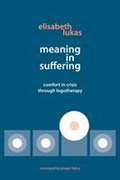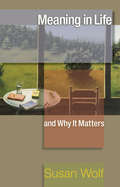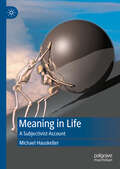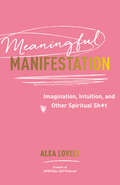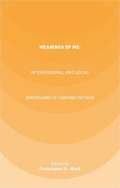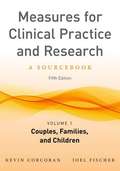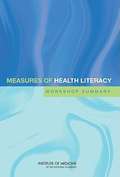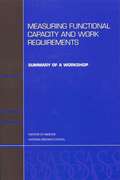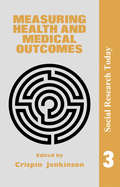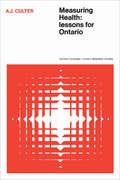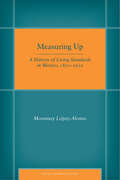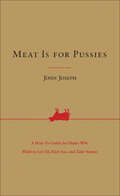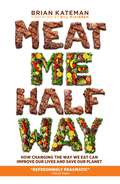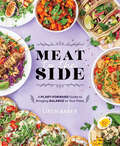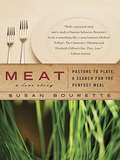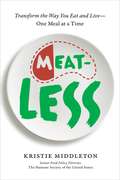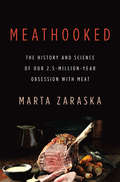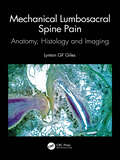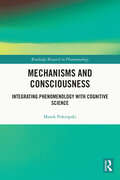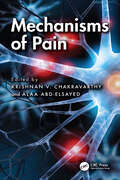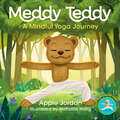- Table View
- List View
Meaning In Suffering: Comfort In Crisis Through Logotherapy
by Elisabeth LukasThis 1986 classic has been renewed with fresh graphics and crisp typesetting. The author’s artistic discovery of the uniqueness of each individual shines across dozens of case studies and examples; thus she illuminates the potential for meaning in the presence of even intractable pain, guilt, and suffering. Lukas demonstrates a living logotherapy, not by standardized techniques, but by the compassion and insight she brings into each therapeutic relationship. "The true heroes of life are not the triumphant victors, but the defeated who find a ray of hope" (p. 52).
Meaning in Life and Why It Matters (The University Center for Human Values Series #40)
by Susan WolfA fresh reflection on what makes life meaningfulMost people, including philosophers, tend to classify human motives as falling into one of two categories: the egoistic or the altruistic, the self-interested or the moral. According to Susan Wolf, however, much of what motivates us does not comfortably fit into this scheme. Often we act neither for our own sake nor out of duty or an impersonal concern for the world. Rather, we act out of love for objects that we rightly perceive as worthy of love—and it is these actions that give meaning to our lives. Wolf makes a compelling case that, along with happiness and morality, this kind of meaningfulness constitutes a distinctive dimension of a good life. Written in a lively and engaging style, and full of provocative examples, Meaning in Life and Why It Matters is a profound and original reflection on a subject of permanent human concern.
Meaning in Life: A Subjectivist Account
by Michael HauskellerThis book develops and defends a subjectivist account of meaning in life, which holds that the only place that meaning can ever be found is in the way we experience the living of our lives. Many philosophers consider that a life can only be meaningful if it meets certain objective standards. For a life to be meaningful, they insist, it needs to make a difference and contribute something important, something that is of value, and not just for the person whose life it is. In contrast, this book contends that meaningfulness is not an objective quality of lives, nor is it in some way dependent on such a quality. Meaning is not like truth, which is commonly thought to be an objective quality of propositions. Statements or beliefs are not true simply because someone thinks or feels that they are true. Something can appear true that is in fact false. But a person cannot feel their life to be meaningful, while in fact it is not, because meaning does not depend on the presence of certain features without which no life can be rightly considered meaningful. The book therefore concludes that many people live a meaningful life. Meaning is not the prerogative of an elite minority. It is not a measure of human accomplishments. This book will be essential reading for philosophers and postgraduate students researching the meaning of life and is also suitable for use in teaching on philosophy courses at university level.
Meaningful Manifestation: Imagination, Intuition, and Other Spiritual Sh*t
by Alea LovelyDetermine what will bring you true fulfillment, examine your most authentic beliefs, and learn to manifest your dreams by building harmony and understanding with the universe.Meaningful Manifestation addresses the gaps that other manifestation books gloss over. Using the IMAGINE method, a unique manifestation framework developed by author Alea Lovely, this book gives you a complete roadmap to get from where you are to where you want to be—and to enjoy the ride!Learn to fall in love with the life you already have, and by achieving this new, positive perspective, become a better vibrational match to what you truly want.The IMAGINE method will guide you through the following 7 lessons:Inception: Where are you starting?Manifestation: What do you want?Anti-Belief: What is the belief challenging what you want?Growth: What change needs to happen to get what you want?Integration: How do you apply that change to your life?Notice: Observing the signs + syncs to help you produce more of it.Expansion: What do you do once you have realized your manifestoManifestation is more than just reciting positive affirmations every day. It is building an understanding of your foundation, your purest desires, and reaching out to embrace the life you want with open arms.
Meanings of ME
by Christopher D. WardChronic fatigue syndrome (CFS or ME) is a problematic diagnosis, and much of the existing writing on the topic is dominated by questions of biology, psychology and causation. The focus on personal, interpersonal and public meanings in Meanings of ME signals a paradigm shift in thinking about CFS/ME. Contributions from clinicians and academics as well as from those who have personal knowledge of CFS/ME highlight the varied experiences of the illness. Rather than insisting on a specifictheory of the illness, the authors provide fresh perspectives on the sometimes conflicting ways in which the diagnosis and symptoms of CFS/ME are interpreted by doctors, patients and others. The book's early chapters survey four different ways in which CFS/ME can be presented: as lived experience, as a scientific phenomenon, as a medical diagnostic classification, and as a product of culture. The personal, interpersonal and public meanings of CFS/ME are then discussed before an explorationof stigma and identity from both personal and professional standpoints.
Measures for Clinical Practice and Research, Volume 1: Couples, Families, and Children (Fifth Edition)
by Kevin Corcoran Joel FischerOne of the key challenges of all types of practice and research is finding a way to measure the problem. This seminal 2-volume book contains hundreds of the most useful measurement tools for use in clinical practice and in research. All measures are critiqued by the editors, who provide guidance on how to select and score them and the actual measures are wholly reproduced. This first volume, focusing on measures for use with couples, families, and children, includes an introduction to the basic priniciples of measurement, an overview of different types of measures, and an overview of the Rapid Assessment Inventories included herein. Volume I also contains descriptions and reviews of each instrument, as well as information on how they were selected and how to administer and score them. This book is designed as the definitive reference volume on assessment measures for both practice and research in clinical mental health. This fifth edition of Corcoran and Fischer's Measures for Clinical Practice and Research is updated with a new preface, new scales, and updated information for existing instruments, expanding and cementing its utility for members of all the helping professions, including psychology, social work, psychiatry, counseling, nursing, and medicine. Alone or as a set, these classic compendiums are powerful tools that clinicians and researchers alike will find an invaluable addition to - or update of - their libraries.
Measures of Health Literacy: Workshop Summary
by Institute of MedicineHealth literacy--the ability for individuals to obtain, process, and understand basic health information and services to facilitate appropriate health decisions--is increasingly recognized as an important facet of health care and health outcomes. Although research on health literacy has grown tremendously in the past decade, there is no widely agreed-upon framework for health literacy as a determinant of health outcomes. Most instruments focus on assessing an individual's health literacy, yet the scope of health literacy reaches far beyond an individual's skills and abilities. Health literacy occurs in the context of the health care system, and therefore measures of health literacy must also assess the demands and complexities of the health care systems with which patients interact. For example, measures are needed to determine how well the system has been organized so that it can be navigated by individuals with different levels of health literacy and how well health organizations are doing at making health information understandable and actionable. To examine what is known about measures of health literacy, the Institute of Medicine convened a workshop. The workshop, summarized in this volume, reviews the current status of measures of health literacy, including those used in the health care setting; discusses possible surrogate measures that might be used to assess health literacy; and explores ways in which health literacy measures can be used to assess patient-centered approaches to care.
Measuring Functional Capacity and Work Requirements: Summary of a Workshop
by Institute of Medicine National Research CouncilA report on Measuring Functional Capacity and Work Requirements
Measuring Health And Medical Outcomes
by Crispin JenkinsonA clear analysis of the design, potential uses and limitations of questionnaires in measuring health from the perspective of the patient. Practical examples illustrate the methodological issues and guide the reader through good and bad practice. The book will appeal to academics, postgraduates and advanced undergraduates in medical sociology, health economics, social/health psychology, public health and epidemiology. It will also be extremely helpful to social science researchers outside these areas who have an interest in the use of questionnaires in an applied field.; "Social research today" is a forthcoming series of books devoted to the illumination of significant methodological topics in the social sciences and professional social research. The structure of social inquiry combines two separate elements: empirical evidence and organizing ideas and theories. Both are necessary for successful social understanding; one without the other is barren. This series will be concerned with the means by which this structure is maintained and kept standing and upright. The books in the series are intended for undergraduates in the social sciences, postgraduate students undergoing research training, and those undertaking social research of whatever kind. Broadly conceived, research methodology refers to the general grounds for the validity of social science propositions. How do we know what we do know about the social world? More narrowly, it deals with questions such as h.; This book is intended for academics, postgraduates and advanced undergraduates within medical sociology, health economics, social/health psychology, public healthand epidemiology. Social science researchers with an interest in theuse of questionnaires in an applied field.
Measuring Health: Lessons for Ontario
by Anthony CulyerPlanning and evaluating any health care program is a formidable task: how do you measure the health of a population? This fundamental question has been approached from various perspectives in medical, administrative, and economic studies. This book provides a guide to health measurement literature and relates it to Ontario's current and prospective policy choices and to the federal context of health indicators and indices to existing statistics in Ontario in a county-by-county survey of the province's health care. He also outlines the kinds of information essential to health assessment but not currently available. The book as a whole emphasizes the importance of health care measurement in the humane and efficient planning of health services. It will be of interest to all concerned with the practice of medicine in the 1980s and the planning of health services at the federal and provincial levels, as well as to those with a special interest in health from the economic, political, and sociological perspectives.
Measuring Progress in Obesity Prevention
by Nutrition Board Committee on Accelerating Progress in Obesity Prevention FoodNearly 69 percent of U. S. adults and 32 percent of children are either overweight or obese, creating an annual medical cost burden that may reach $147 billion. Researchers and policy makers are eager to identify improved measures of environmental and policy factors that contribute to obesity prevention. The IOM formed the Committee on Accelerating Progress in Obesity Prevention to review the IOM's past obesity-related recommendations, identify a set of recommendations for future action, and recommend indicators of progress in implementing these actions. The committee held a workshop in March 2011 about how to improve measurement of progress in obesity prevention.
Measuring Up
by Kevin LemanTHINK YOU CAN BE PERFECT? THINK AGAIN! Do you ever have feelings of self-doubt and inadequacy ever have the uneasy feeling that you just don't "measure up? Does, it ever seem that you just can't do anything right? Now you can break free from failure and discouragement. You can give yourself-and your children-the greatest gift of all: self-esteem. Dr Kevin Leman, renowned psychologist and best-selling author understands the problems. He has some startling answers. He shows you: 1 The hidden factors that can undermine everything you do The six steps to flexibility and freedom 1: How to lead a guilt-free life How to overcome rejection-deal with the pain and rebuild your life How to succeed on the job-and why so many fail how to build better communications with your child The nine steps to raising self-confident children How to raise a really responsible child 1 1 How to deal with your child's hurts and failures--the nine steps that short-circuit discouragement and defeat The secrets that have worked for millions can work for you. Here is everything you need, including quizzes, step-by-step strategies, and time-tested wisdom--the keys to successful living and..
Measuring Up: A History of Living Standards in Mexico, 1850-1950
by Moramay Lopez-AlonsoMeasuring Uptraces the high levels of poverty and inequality that Mexico faced in the mid-twentieth century. Using newly developed multidisciplinary techniques, the book provides a perspective on living standards in Mexico prior to the first measurement of income distribution in 1957. By offering an account of material living conditions and their repercussions on biological standards of living between 1850 and 1950, it sheds new light on the life of the marginalized during this period. Measuring Upshows that new methodologies allow us to examine the history of individuals who were not integrated into the formal economy. Using anthropometric history techniques, the book assesses how a large portion of the population was affected by piecemeal policies and flaws in the process of economic modernization and growth. It contributes to our understanding of the origins of poverty and inequality, and conveys a much-needed, long-term perspective on the living conditions of the Mexican working classes.
Meat Is for Pussies: A How-To Guide for Dudes Who Want to Get Fit, Kick Ass, and Take Names
by John Joseph“[Joseph’s] advice works: The benefits of a plant based diet can be profound.” —Robert Ostfeld, MD, Director of the Cardiac Wellness Program, Montefiore Hospital and Associate Professor of Clinical Medicine, Albert Einstein College of MedicineJohn Joseph wants men to know, in no uncertain terms, that they don’t need to eat steak, burgers, wings, or any other animal product to be strong—in fact, he would argue, eating animals is for the weak.In Meat is for Pussies, Joseph offers both personal and scientific evidence that a plant-based diet offers the best path to athleticism, endurance, strength, and overall health. In addition to dispelling the myths surrounding meat, Joseph offers workout advice, a meal plan, and recipes that make going plant-based easy. Flavor and vitamin-packed options like the Working Man Stew and Veggie Chili with Cornbread will keep men’s (and women’s) bodies healthy and energized, while workouts that emphasize cardio and strength training build endurance and stamina and prove that you don’t need meat to build muscle.As an Ironman Triathlete in his fifties who is still rocking out as the frontman for his legendary band the Cro-Mags, Joseph is living proof that living a plant-based lifestyle is badass. At the end of the day, he wants readers to live a long, healthy, happy life . . . and he won’t take no for an answer.“John has written the quintessential pussy-transformation guide.” —Brendan Brazier, author of Thrive: The Vegan Nutrition Guide To Optimal Performance in Sports and Life“John’s book proves you don’t need meat to be strong, kick ass and be athletically competitive.” —Jake Shields, MMA Champion Fighter
Meat Market
by Juno DawsonWINNER OF THE YA BOOK PRIZE 2020Jana Novak's history sounds like a classic model cliché: tall and gangly, she's uncomfortable with her androgynous looks until she's unexpectedly scouted and catapulted to superstardom...But the fashion industry is as grimy as it is glamorous. And there are unexpected predators at every turn. Jana is an ordinary girl from a south London estate, lifted to unimaginable heights. But the further you rise, the more devastating your fall ... Honest and raw, this is a timely exposé of the dark underbelly of the fashion industry in an era of #TimesUp and #MeToo. It might just be Juno Dawson's most important book yet.'Juno Dawson slashes through the glamour of the fashion industry ... combining blockbuster appeal with piercing commentary on modelling, body image and consent' Observer'Guaranteed to be your summer read' Glamour
Meat Market: The London Collection
by Juno DawsonFall into the lives of the city's filthy rich with Juno Dawson's deliciously dark and intoxicating London Collection. <p><p>Jana Novak's history sounds like a classic model cliché: tall and gangly, she's uncomfortable with her androgynous looks until she's unexpectedly scouted and catapulted to superstardom. But the fashion industry is as grimy as it is glamorous. And there are unexpected predators at every turn. <p><p>Jana is an ordinary girl from a south London estate, lifted to unimaginable heights. But the further you rise, the more devastating your fall ... <p><p>Honest and raw, this is a timely exposé of the dark underbelly of the fashion industry in an era of #TimesUp and #MeToo. It might just be Juno Dawson's most important book yet.
Meat Me Halfway: How Changing the Way We Eat Can Improve Our Lives and Save Our Planet
by Brian KatemanWe know that eating animals is bad for the planet and bad for our health, and yet we do it anyway. Ask anyone in the plant-based movement and the solution seems obvious: Stop eating meat. But, for many people, that stark solution is neither appealing nor practical. In Meat Me Halfway, author and founder of the reducetarian movement Brian Kateman puts forth a realistic and balanced goal: mindfully reduce your meat consumption. It might seem strange for a leader of the plant-based movement to say, but meat is here to stay. The question is not how to ween society off meat but how to make meat more healthy, more humane, and more sustainable. In this book, Kateman answers the question that has plagued vegans for years: why are we so resistant to changing the way we eat, and what can we do about it? Exploring our historical relationship with meat, from the domestication of animals to the early industrialization of meatpacking, to the advent of the one-stop grocery store, the science of taste, and the laws that impact our access to food, Meat Me Halfway reveals how humans have evolved as meat eaters. Featuring interviews with pioneers in the science of meat alternatives, investigations into new types of farming designed to lessen environmental impact, and innovations in ethical and sustainable agriculture, this down-to-earth book shows that we all can change the way we create and consume food.
Meat to the Side: A Plant-Forward Guide to Bringing Balance to Your Plate
by Liren BakerAlmost anyone will tell you that you should &“eat your veggies,&” but if you grew up on canned green beans and frozen mixed vegetables, the idea of making plants the center of your meals may seem pretty unappealing. Meat to the Side is author Liren Baker&’s beginner&’s guide for people who want a delicious way to add more vegetables to their diets. Liren&’s easy-to-follow recipes are accompanied by full-color photos and augmented with helpful information about where to find ingredients, how to make swaps in recipes, and how to get the most bang for your buck at the store. This book offers more than 80 plant-forward recipes with flavor combinations that appeal to a range of palates and dietary needs, so you&’ll feel empowered to make the first step toward giving plants a more prominent place in your meals.
Meat: A Love Story
by Susan BouretteAfter working undercover at a slaughterhouse for an exposé on meat processing, Susan Bourette resolved to go completely vegetarian. She lasted approximately five weeks. Dissatisfied with tofu and lentils, Susan began her quest for the perfect meat- one she could enjoy without guilt. With a reporter's eye and a carnivore's appetite, Bourette takes readers behind the bucolic façade of the famous Blue Hill farm; on a long, hot Texas cattle drive, a whale hunt with the Inupiat and a Canadian moose hunt; and behind the counter in a Greenwich Village butcher shop. Humorous yet authoritative, Meat celebrates the pleasure of eating meat, as well as the lives of those who hunt, raise, and cook it-and most important, the rewards of being a compassionate carnivore.
MeatLess: Transform the Way You Eat and Live--One Meal at a Time
by Kristie MiddletonCountless people are now cutting back on meat by enjoying more plant-based meals-to look and feel better, have a lighter eco-footprint, or to help animals. If you want to eat less meat and dairy without giving them up entirely, MeatLess offers concrete rationale and easy steps for reducing animal products. Kristie Middleton, senior food policy director for The Humane Society of the United States, shares inspirational stories from people who've lost weight, reached their health goals, helped animals, and improved their environmental footprint through plant-based eating. Along with its delicious, satisfying recipes that anyone can make, MeatLess offers tips and tricks for overcoming common barriers to diet change and how to make a better lifestyle stick-such as easy food swaps, where to dine out, and how to set and meet your goals. Whether you're a passionate meat lover or vegan-curious, MeatLess is the roadmap for a healthier life and a better you.
Meathooked: The History and Science of Our 2.5-Million-Year Obsession with Meat
by Marta ZaraskaA few years ago, Marta Zaraska’s mother decided to go vegetarian after stumbling upon an article on the health risks of eating meat. Her resolve lasted about a fortnight before the juicy hams and the creamy pâtés began creeping back into her refrigerator. Prodded to explain her lapse, she replied, "I like meat, I eat it, end of story. ” Many of us have had a similar experience. What makes us crave animal protein, and what makes it so hard to give up? And if all the studies are correct, and consuming meat is truly unhealthy for us, why didn’t evolution turn us all into vegetarians in the first place? In Meathooked, Zaraska explores what she calls the "meat puzzle”: our love of meat, despite its harmful effects. Scientific journals overflow with reports of red meat raising the risk of certain cancers; each hamburger contributes as much to global warming as does driving a car 320 miles; and the horrors of industrial meat production are now well-known. None of these facts have prompted us to give up our hamburgers and steaks. On the contrary, meat consumption has only increased over the past decades. Taking the reader to India’s unusual steakhouses, animal sacrifices at temples in Benin, and labs in Pennsylvania where meat is being grown in petri dishes, Zaraska examines the history and future of meat and meat-eating, showing that while our increasing consumption of meat can be attributed in part to the power of the meat industry and the policies of our governments, the main "hooks” that keep us addicted to meat are much older: genes and culture. An original and thought-provoking exploration of carnivorousness, Meathooked explains one of the most enduring features of human civilization--and why meat-eating will continue to shape our bodies and our world into the foreseeable future.
Mechanical Lumbosacral Spine Pain: Anatomy, Histology and Imaging
by Lynton GF GilesThis book addresses an extremely prevalent medical problem: low back pain. It is not a general anatomy book, but it relates specifically to the lumbosacral spine, encompassing anatomy, histology, histopathology, and imaging all in one volume. For students, the text incrementally introduces them to lumbosacral anatomy terms and scientific knowledge by using photographs of gross and histological sections of the spine, as well as schematic drawings and images, in preparation for clinical practice. It answers many questions about the pathogenesis of low back pain, helpful for clinicians, both for treatment decisions and for counselling patients.Key features: Provides a clear explanation for many of the pain generators in low back pain and illuminates this perplexing and ubiquitous problem Addresses a gap in the existing literature, as 'non-specific' or mechanical lumbosacral spine pain accounts for by far most chronic spinal pain sufferers’ complaints for clinicians from general medical practitioners to spinal specialists in various fields such as sports medicine who deal with spinal pain syndromes Illustrates anatomical structures that can be injured and thus become responsible for causing mechanical lumbosacral spine pain; frequently, such injuries cannot be detected on sophisticated imaging such as MRI
Mechanisms and Consciousness: Integrating Phenomenology with Cognitive Science (Routledge Research in Phenomenology)
by Marek PokropskiThis book develops a new approach to naturalizing phenomenology. The author proposes to integrate phenomenology with the mechanistic framework that offers new methodological perspectives for studying complex mental phenomena such as consciousness. While mechanistic explanatory models are widely applied in cognitive science, their approach to describing subjective phenomena is limited. The author argues that phenomenology can fill this gap. He proposes two novel ways of integrating phenomenology and mechanism. First, he presents a new reading of phenomenological analyses as functional analyses. Such functional phenomenology delivers a functional sketch of a target system and provides constraints on the space of possible mechanisms. Second, he develops the neurophenomenological approach in the direction of dynamic modeling of experience. He shows that neurophenomenology can deliver dynamical constraints on mechanistic models and thus inform the search for an underlying mechanism. Mechanisms and Consciousness will be of interest to scholars and advanced students working in phenomenology, philosophy of mind, and the cognitive sciences.
Mechanisms of Pain
by Alaa Abd-Elsayed Krishnan V. ChakravarthyPain is a serious health problem. This book presents an intensive review of the anatomy, physiology, and pharmacology of the systems that mediate nociceptive processing. The authors cover areas that include anatomy, central and peripheral nerve processing, tissue and nerve injury states, as well as preclinical and clinical models of pain. Mechanisms of Pain also covers important clinical concepts, with specific emphasis on mechanisms of action. Written by world renowned global faculty, this book covers important areas of science required to understand pain medicine. Important topics covered include post–tissue and nerve injury pain states of primary afferents and the spinal cord. The authors also cover mechanisms of action of clinically relevant analgesics (opiates and non-opiates), psychological aspects of pain, pathophysiology of migraines, as well as the genetics of pain. This comprehensive book is to guide undergraduate, graduate, and clinicians in the field of pain medicine on important concepts related to the science and practice of pain.
Meddy Teddy: A Mindful Journey
by Apple JordanSay namaste to Meddy Teddy, a rising star in the yogi world, in his debut picture book!Media and social media sensation Meddy Teddy is a cuddly, yoga pant-clad, completely poseable plush bear that introduces meditation and mindfulness practices to little yogis. In this first-ever companion book, Meddy encourages readers to try yoga poses as he comes out of hibernation, greets the springtime, and teaches his forest friends how to mindfully get through a variety of situations. On each page, Meddy shows how to execute a pose, including downward-facing dog, tree pose, the Warrior, and more. The youngest yogis, and their families and friends, will rejoice as they master each one, and work up to completing the whole sequence! Yoga and mindfulness have proven benefits for kids: they help them become aware of their own bodies, and deal with feelings like anxiety, frustration, confusion, fear, and sadness in a healthy way. Meddy Teddy is perfect for introducing kids (and grown ups) of all ages to the practice of yoga.
